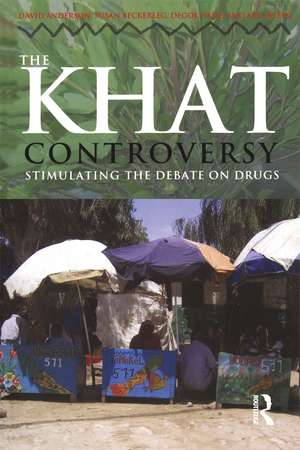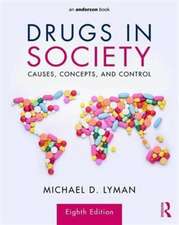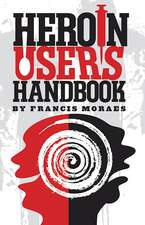The Khat Controversy: Stimulating the Debate on Drugs: Cultures of Consumption
Autor David Anderson, Susan Beckerleg, Degol Hailu, Axel Kleinen Limba Engleză Paperback – mai 2007
| Toate formatele și edițiile | Preț | Express |
|---|---|---|
| Paperback (1) | 286.08 lei 6-8 săpt. | |
| Taylor & Francis – mai 2007 | 286.08 lei 6-8 săpt. | |
| Hardback (1) | 1017.32 lei 6-8 săpt. | |
| Taylor & Francis – mai 2007 | 1017.32 lei 6-8 săpt. |
Preț: 286.08 lei
Nou
Puncte Express: 429
Preț estimativ în valută:
54.74€ • 59.70$ • 46.16£
54.74€ • 59.70$ • 46.16£
Carte tipărită la comandă
Livrare economică 24 aprilie-08 mai
Preluare comenzi: 021 569.72.76
Specificații
ISBN-13: 9781845202514
ISBN-10: 1845202511
Pagini: 266
Ilustrații: bibliography, index
Dimensiuni: 156 x 234 x 15 mm
Greutate: 0.49 kg
Ediția:1
Editura: Taylor & Francis
Colecția Routledge
Seria Cultures of Consumption
Locul publicării:Oxford, United Kingdom
ISBN-10: 1845202511
Pagini: 266
Ilustrații: bibliography, index
Dimensiuni: 156 x 234 x 15 mm
Greutate: 0.49 kg
Ediția:1
Editura: Taylor & Francis
Colecția Routledge
Seria Cultures of Consumption
Locul publicării:Oxford, United Kingdom
Cuprins
List of Figures, Tables MapsPreface AcknowledgementsIntroduction1. Going Global: The Khat ControversyKhat and its effectsMogadiscio to MinneapolisTrust technologyPart I Khat in the Horn2. Devil's Cud or Farmers' Boon?Diversifying in the dollar leafEthiopia's khat farmersForeign exchange, taxation the khat economy3. Trading the Dollar LeafEthiopia's khat marketsThe export trade4. Consuming Habits along the Red Sea LittoralThe Ethiopian heartlandsUrban DjiboutiSomalilandPart II Khat in East Africa5. Made in Meru: A Market HistoryTraditions colonial controlsCo-operatives exportsKhat wars a global brand6. Kenya's Khat TradeNyambene beyondReaching the consumerCampaigning against khat7. On the Khat Frontier: UgandaUganda's 'new' producersHidden retailingSurveying consumptionPart III Khat in the Diaspora8. The Ambivalent AmphetamineStrains and tensionsA Mafrish in the neighbourhood9. Transnational DebatesInternational tradeKhat and crimeThe social issues10. The Politics of Khat ControlThe khat control lobbyKhat in CanadianThe Swedish storyConclusion11. Prohibition? Khat and the Drugs DebateAppendix A: List of InformantsBibliographyIndex
Notă biografică
David Anderson is Lecturer in African Studies, University of Oxford and Research Fellow, St Antony's College, Oxford. Susan Beckerleg is an International Consultant and specializes on the social aspects of illicit substance use. Degol Hailu is a research academic at the School of Oriental and African Studies (SOAS), University of London. He is currently on leave from SOAS and works for the United Nations Development Programme (UNDP) as policy advisor for the Caribbean region. Axel Klein is Lecturer in Addictive Studies at the Kent Institute of Medicine and Health Studies, University of Kent.
Descriere
Khat. A harmless natural stimulant or a lethal epidemic sweeping through the international drugs trade? Interwoven with case studies from Djibouti to Rome, The Khat Controversy goes deeper to explore contemporary issues relating to globalization, ethnicity and culture.


















